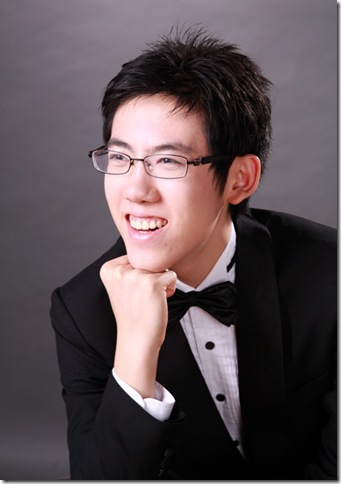He is young and only at the beginning of his career, but Haochen Zhang already has a firm grasp on how to build a good concert program.
Zhang, the gold medalist at the last Van Cliburn Competition in 2009, is ending his concert tonight at the Kravis Center with Islamey, Mili Balakirev’s corker of a showpiece, and one favored by an older generation of pianists. It doesn’t have the same depth as most of the rest of his program, he admits, but that’s all part of putting together a smart show.
“A virtuosic piece is needed, because you need to show what you can do to bring out the various forms of music,” Zhang said from a stop on the road out West. “Music is not only about the spiritual things. You need to do the virtuosic things to heat up the whole concert hall.
“ ‘Islamey’ is a perfect piece to end the concert. It creates a really good effect, and it’s very contrasting to the pieces before it,” he said.
And Zhang has done his share of heating up the hall. Born in 1990 in Shanghai to a non-musical family, he soon showed evidence of prodigious talent, making his debut at age 5 with all of the Two-Part Inventions of Bach, and at 6, playing the Mozart Concerto No. 21 (in C, K. 467), with the Shanghai Symphony Orchestra.
He entered the Shanghai Conservatory at age 11, and then came to the Curtis Institute in Philadelphia, where he now lives and continues to study with pianist Gary Graffman. He’s set to do about 70 concerts this year, half recitals and other half in concerto appearances.
Winning the Cliburn at a young age hasn’t led him to seek virtuosity for its own sake, despite the flashiness of the competition.
“I don’t have any problem with virtuosic pieces, because first of all, I’m comfortable with the technique,” he said matter-of-factly. “It’s part of music, it’s part of the expression. It’s not just one form, just spiritual, soul-uplifting music.”
Zhang’s program opens with a set of Chopin mazurkas, including the well-known one in A minor, Op. 17, No. 4 to start; the others are the mazurkas in C (Op. 24, No. 2), A-flat (Op. 59, No. 2) and F-sharp minor (Op. 59, No. 3). He follows that set the last of Beethoven’s sonatas (No. 32 in C minor, Op. 111), an enigmatic, highly original piece that remains a pillar of the pianistic repertoire.
He’ll open the second half with the Ballade No. 2 (in B minor) of Liszt, then do a quartet of Preludes from Debussy’s first book: De pas sur la neige; Les sons et les parfums tournent dans l’air du soir; Les collines d’Anacapri; and La cathedrale engloutie. The final work is Islamey.
For Zhang, the most difficult piece is probably the Beethoven.
“Nothing that I know now in the solo piano literature could be more challenging than the last sonatas of Beethoven. All of them. And Op. 111 is probably the hardest of all,” Zhang said. “Just structure-wise, it’s just so hard to make this whole piece [hang] together.”
That applies in particular to the sonata’s second and final movement, 18 minutes of glacially slow variations on a simple C major melody. It’s very difficult to keep the structure in place while bringing out all the internal, subtle details.
“It’s so easy to make people feel that the piece is falling into fragments, or they feel bored,” he said. “It’s very easy for them to feel bored … when I was 10 and auditioning at Shanghai Music Conservatory and was accepted, I was already a professional. If I were then to listen to the Beethoven Sonata Op. 111 for the first time, I would feel bored, too.
“It takes a lot of effort and concentration, not only for the pianist, but the listeners as well,” he said. “That’s why it’s a challenge for me to choose this in my program, but I just think it’s a great experience for me to mature myself. Just because it’s hard doesn’t mean you shouldn’t dare to play it. … You grow a lot. I’ve learned several other late Beethoven sonatas before, and I always feel myself growing more in music afterward.”
Despite his exceptional talent and record of achievement, it’s still a tough business, full of wonderful players vying for a piece of the audience. Zhang is undeterred.
“I try my best just to be myself,” he said. “Of course, you can learn from others, but all you can do is offer your own unique perspective on music. And that’s what I’m doing.”
Haochen Zhang appears at 7:30 tonight at the Rinker Playhouse, Kravis Center, in his Florida debut. Tickets are $38. Call 832-7469 or visit www.kravis.org.
